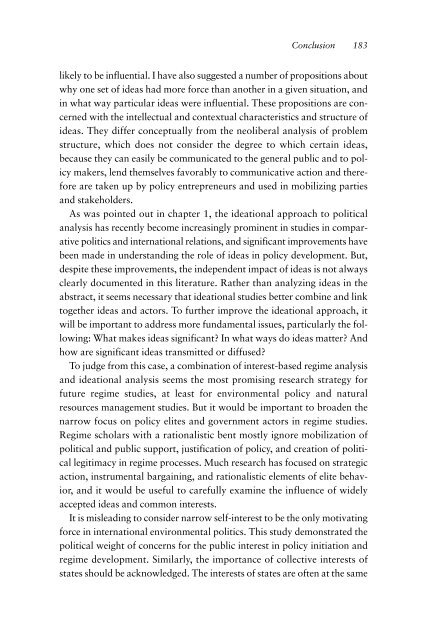Radioactive Waste Disposal at Sea: Public Ideas ... - IMO
Radioactive Waste Disposal at Sea: Public Ideas ... - IMO
Radioactive Waste Disposal at Sea: Public Ideas ... - IMO
Create successful ePaper yourself
Turn your PDF publications into a flip-book with our unique Google optimized e-Paper software.
Conclusion 183<br />
likely to be influential. I have also suggested a number of propositions about<br />
why one set of ideas had more force than another in a given situ<strong>at</strong>ion, and<br />
in wh<strong>at</strong> way particular ideas were influential. These propositions are concerned<br />
with the intellectual and contextual characteristics and structure of<br />
ideas. They differ conceptually from the neoliberal analysis of problem<br />
structure, which does not consider the degree to which certain ideas,<br />
because they can easily be communic<strong>at</strong>ed to the general public and to policy<br />
makers, lend themselves favorably to communic<strong>at</strong>ive action and therefore<br />
are taken up by policy entrepreneurs and used in mobilizing parties<br />
and stakeholders.<br />
As was pointed out in chapter 1, the ide<strong>at</strong>ional approach to political<br />
analysis has recently become increasingly prominent in studies in compar<strong>at</strong>ive<br />
politics and intern<strong>at</strong>ional rel<strong>at</strong>ions, and significant improvements have<br />
been made in understanding the role of ideas in policy development. But,<br />
despite these improvements, the independent impact of ideas is not always<br />
clearly documented in this liter<strong>at</strong>ure. R<strong>at</strong>her than analyzing ideas in the<br />
abstract, it seems necessary th<strong>at</strong> ide<strong>at</strong>ional studies better combine and link<br />
together ideas and actors. To further improve the ide<strong>at</strong>ional approach, it<br />
will be important to address more fundamental issues, particularly the following:<br />
Wh<strong>at</strong> makes ideas significant? In wh<strong>at</strong> ways do ideas m<strong>at</strong>ter? And<br />
how are significant ideas transmitted or diffused?<br />
To judge from this case, a combin<strong>at</strong>ion of interest-based regime analysis<br />
and ide<strong>at</strong>ional analysis seems the most promising research str<strong>at</strong>egy for<br />
future regime studies, <strong>at</strong> least for environmental policy and n<strong>at</strong>ural<br />
resources management studies. But it would be important to broaden the<br />
narrow focus on policy elites and government actors in regime studies.<br />
Regime scholars with a r<strong>at</strong>ionalistic bent mostly ignore mobiliz<strong>at</strong>ion of<br />
political and public support, justific<strong>at</strong>ion of policy, and cre<strong>at</strong>ion of political<br />
legitimacy in regime processes. Much research has focused on str<strong>at</strong>egic<br />
action, instrumental bargaining, and r<strong>at</strong>ionalistic elements of elite behavior,<br />
and it would be useful to carefully examine the influence of widely<br />
accepted ideas and common interests.<br />
It is misleading to consider narrow self-interest to be the only motiv<strong>at</strong>ing<br />
force in intern<strong>at</strong>ional environmental politics. This study demonstr<strong>at</strong>ed the<br />
political weight of concerns for the public interest in policy initi<strong>at</strong>ion and<br />
regime development. Similarly, the importance of collective interests of<br />
st<strong>at</strong>es should be acknowledged. The interests of st<strong>at</strong>es are often <strong>at</strong> the same

















